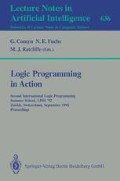Abstract
A suite of Prolog tools for reverse-engineering and validating COBOL programs has been developed as part of the ESPRIT REDO project [8]. These tools produce functional abstractions, object-oriented designs and documentation from raw source code, with the aim of improving comprehensibility and maintainability, and this article discusses the tools and aspects of their programming.
Preview
Unable to display preview. Download preview PDF.
References
Breuer P. The First Step Backwards, REDO project document 2487-TN-PRG-1031, Oxford University Computing Laboratory, 11 Keble Road, Oxford OX1 3QD, UK.
Breuer P., Lano K., From Code to Specifications: Reverse Engineering Techniques, Software Maintenance — Research and Practice, Sept. 1991.
Breuer P., Lano K., Reverse Engineering COBOL Software Maintenance — Research and Practice, 1992.
Breuer P., et al. Understanding Programs through Formal Methods PRG-TR-15-91, Oxford University Computing Laboratory, 1991.
Cartmell J., Alderson A., The Eclipse Two-Tier Database, Chapter 5, ECLIPSE Manual, IPSYS Software Ltd, Marlborough Court, Pickford St., Macclesfield, Cheshire, 1990.
Gries D., The Science of Programming, Springer-Verlag, 1981.
S.C. Johnson and M.E. Lesk. Language development tools. The Bell System Technical Journal 57(6) part 2, pp. 2155–2175, July/August 1978.
Katsoulakos P., Reverse Engineering, Documentation and Validation: The REDO Project, ESPRIT 89 Conference, Brussels, 1990.
Lano K., An Outline Specification of the CICS Application Programmers Interface REDO Document TN-2487-PRG-1025, Oxford University Programming Research Group, 1989.
Lano K., The Transformation of Specifications into Code, REDO Document TN-2487-PRG-1023, Oxford University Programming Research Group, 1990.
Lano K., Z++, An Object-Oriented Extension to Z, Proc. 5th Annual Z User Meeting, December 1990, Springer-Verlag Workshops in Computer Science, 1991, to appear.
Linger R., Hausler P., Pleszlioch M., Heruer A., Using Functional Abstraction to Understand Program Behavior, IEEE Software, Jan. 1990.
Parkin A., COBOL for Students, Edward Arnold, London, 1984.
Spivey M., The Z Notation: A Reference Manual, Prentice Hall, 1989.
Stanley-Smith C., Cahill A., UNIFORM: A Language Geared To System Description and Transformation, University of Limerick, 1990.
Quintus Prolog Version 2.5 Manual, Artificial Intelligence International Ltd., Watford, U.K., 1990.
Author information
Authors and Affiliations
Editor information
Rights and permissions
Copyright information
© 1992 Springer-Verlag Berlin Heidelberg
About this paper
Cite this paper
Breuer, P.T. (1992). The art of computer un-programming: Reverse engineering in Prolog. In: Comyn, G., Fuchs, N.E., Ratcliffe, M.J. (eds) Logic Programming in Action. LPSS 1992. Lecture Notes in Computer Science, vol 636. Springer, Berlin, Heidelberg. https://doi.org/10.1007/3-540-55930-2_20
Download citation
DOI: https://doi.org/10.1007/3-540-55930-2_20
Published:
Publisher Name: Springer, Berlin, Heidelberg
Print ISBN: 978-3-540-55930-6
Online ISBN: 978-3-540-47312-1
eBook Packages: Springer Book Archive

